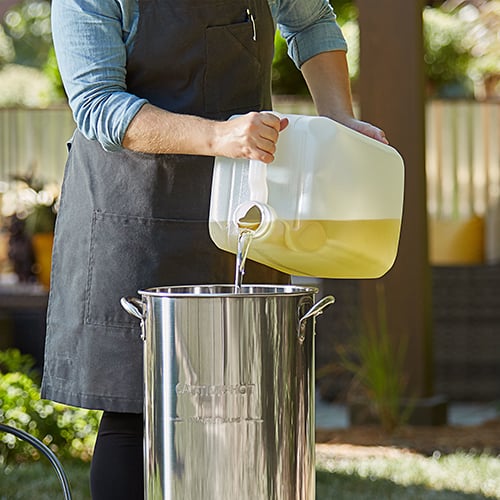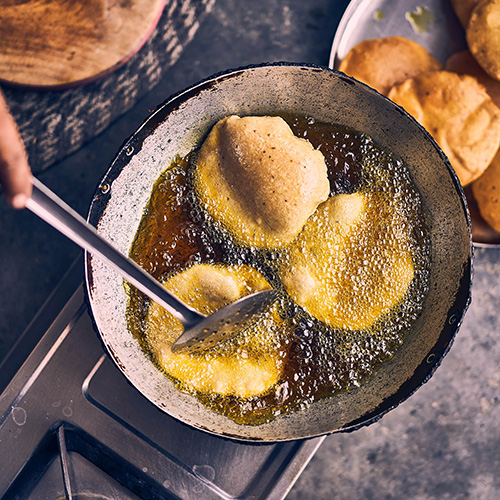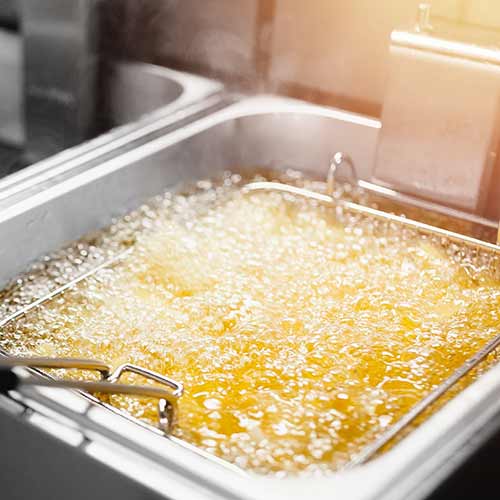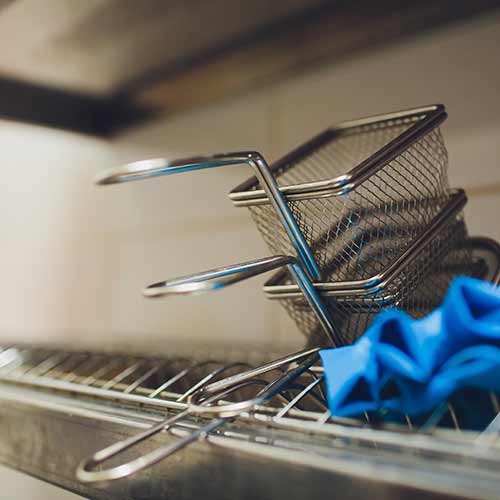How To Filter Deep Fryer Oil
You can detect fried foods on the menus from all kinds of establishments. Whether you own a burger identify, an Italian eatery, or you lot want to attempt frying a turkey as a holiday special, knowing what oil to apply in your fryer and how to maintain it is central for producing high-quality fried foods. In this article, we will tell you how to select the best deep fryer oil, how oft you should change information technology, how to filter fryer oil, and even how to dispose of your oil in one case information technology becomes unusable.
Shop All Fryer Oil Filtration Accessories
All-time Oil for Frying
Vegetable oil is the best oil for deep frying. Canola oil and peanut oil are other popular options.

While vegetable oil, canola oil, and peanut oil are the most popular oils for deep frying, there are several other oil options you tin can choose:
- Grapeseed Oil
- Soybean Oil
- Lard
- Corn Oil
- Cottonseed Oil
Healthiest Oil for Frying
The healthiest oil to fry with is olive oil. Another great option is avocado oil. These oils are high in monosaturated fats, which is considered to be a healthy fat in comparing to polyunsaturated fats.
Best Oil to Fry Chicken
Vegetable oil, canola oil, and peanut oil are the best oils to fry chicken. Their high smoke points and neutral tastes make them platonic for frying craven.
Best Oil for French Fries
The best oil to fry french fries is a neutral-tasting oil, such as vegetable, canola, or peanut oil. These oils also have a loftier smoke point, which is ideal for making certain your oil doesn't burn down too speedily.
Peanut Oil for Frying
Peanut oil is low in saturated fat and high in polyunsaturated and monounsaturated fats. As a result, it is a healthier alternative to other frying fats like shortening and lard. Although information technology is fabricated from peanuts, not all peanut oil is considered an allergen. Highly refined peanut oil is rubber for many people with peanut allergies, while cold-pressed, expelled, and extruded peanut oils are considered allergens.
Vegetable Oil for Frying
Vegetable oil is an ideal oil for frying because it is a great all-purpose oil and can be used for deep-frying, pan-frying, or sauteeing. Vegetable oils are not all the same equally some are made upwardly of 100% soybean, while other vegetable oil blends are fabricated of a mix of soybean, sunflower, corn, and more. Since vegetable oils contain different blends, each vegetable oil will take a different fume point and tin range from 400-450 degrees Fahrenheit.
Canola Oil for Frying
Canola oil is a lower-fat alternative to shortening and lard, and it is more affordable than many other cooking oils. Plus, information technology is hands accessible, making it a popular selection for kitchens everywhere.
Best Oil for Pan Frying
Olive oil is the best oil to use for pan-frying. Coconut oil, avocado oil, sesame oil, and butter are as well cracking oils for pan-frying.
How to Cull the Best Oil for Deep Frying
If y'all're unsure of what kind of oil to employ in your deep fryer, there are two main factors to consider: smoke point and sense of taste.

Oil's smoke point is the temperature at which the oil starts to break down while it is heated. At this temperature, the oil volition kickoff to fume before information technology eventually catches burn with increased temperature. When oil begins to fume, it starts to taste "off" and loses much of its nutritional value.
How Tin can Oil's Taste Impact Food in a Deep Fryer?
Because deep frying requires your food to be submerged in oil for its unabridged cooking process, using oil with a stiff gustation can bear upon the flavor of the food you're frying. For instance, olive oil is often recognized for its distinctive taste that is desirable in dishes like pasta or as a dressing for salads. Nevertheless, its robust season may not pair well with many traditional fried foods.
Why Vegetable Oil, Peanut Oil, and Canola Oil Are the Best for Deep Frying
Vegetable oil, peanut oil, and canola oil are ideal for apply in deep fryers because of their high smoke points. With vegetable oil's smoke point ranging from 400-450 degrees Fahrenheit, peanut oil's smoke point at 450 degrees Fahrenheit and canola oil'southward at 400 degrees Fahrenheit, these three oils tin remain stable throughout your frying process. Most frying occurs between the temperatures of 350 to 400 degrees Fahrenheit, so information technology's imperative that you apply oil with a smoke indicate of at least 400 degrees to avert contaminating the sense of taste of your food and putting yourself at hazard of injury.
Vegetable, peanut, and canola oil'due south neutral taste also make it an fantabulous candidate for deep frying.
How Often Should I Change the Oil in My Deep Fryer?
How long you can continue oil in your deep fryer depends on what you've been frying and how often, the quality of the oil, and how clean your fryer is. While in that location is no one-fourth dimension limit that applies to all situations, it is simple to know when to change your deep fryer oil.
How Do I Know When to Alter My Deep Fryer Oil?

Change the oil in your deep fryer when:
- It smokes at lower temperatures than usual
- Darkens in color
- Begins to scent off-putting
- Becomes thickened and foamy at the surface
These are all signs that your oil is breaking down and is no longer usable. This being said, do not wait for all of these signs to change your oil. Any ane of these changes tin can make your oil difficult or unsafe to work with, and so it is best to proceed your oil fresh.
Tin I Get out Oil in My Deep Fryer?
While it is all-time to store oil outside of your fryer when it is not in use for long periods of time, y'all can leave oil in your deep fryer for brusk periods. That being said, it is of import to first filter the oil to ensure that whatsoever food debris does not spoil while in the fryer. Additionally, you should always keep your fryer covered and absurd when it is non in use considering low-cal and oestrus are two of the major factors in oil spoiling.
Ideally, you lot should store your oil in a cool, dark place. Storing filtered oil in an airtight container that does non let in light tin assist extend the life of your oil and save you coin.
How to Clean and Filter Deep Fryer Oil

Before yous tin clean and filter your deep fryer oil, you must make certain that the oil is cool. Hot or warm oil could put you at gamble for burns and could damage your filtering equipment. Once your oil is cool, use a skimmer to remove any floating nutrient debris from the oil's surface.
How to Filter a Small Batch of Deep Fryer Oil
- Drape cheesecloth over a chinois. This will assistance to remove pocket-size bits of nutrient droppings.
- Position your chinois over a funnel and storage container. Brand sure that the container is large enough to catch all of the filtered oil.
- Pour the oil slowly through the cheesecloth and chinois. Now your oil is clean and fix for re-use.
How to Filter a Large Batch of Deep Fryer Oil
If y'all have a larger batch of oil to filter, you may want to consider investing in a fryer oil filtration system. In many cases, these machines will remove the oil from your fryer, filter it, and then return the oil to the fryer. Manual fryer oil filtration machines save energy because they are powered by manus. Electric fryer oil filtration systems power the transfer and filtration process with electricity and are more than efficient.
How to Dispose of Deep Fryer Oil
To properly dispose of used cooking oil from your deep fryer, pour your oil into a sealable pocketbook and put it in the trash. Always check your bags for rips or punctures before transferring the oil, because even a wearisome leak could create a mess in your trash bin or dumpster.
Alternatively, y'all can find disposal centers that recycle the cooking oil. Some areas have organizations that collect oil for recycling, and they may fifty-fifty pay yous for your contributions. If this is not available in your area, you lot tin expect into oil drove services for restaurants. These organizations volition come to your business concern and take away your oil for you.
Can You Pour Oil Downwardly the Drain?
No. While it may be tempting to dump your cooking oil down the drain, disposing of your oil this way could be against your local ordinances. Never pour deep fryer oil down your drain, even with hot water. The fat particles in your oil may solidify and block your pipes, causing major bug with your plumbing system.
While deep fryers are smashing for cooking an array of popular concession stand up foods, choosing the right oil and knowing how to maintain it can be catchy. If you have fryers in your commercial kitchen, you know the importance of keeping the oil fresh and clean, and so your food can come out every bit well as possible. When your oil changes color, scent, or becomes foamy, be sure to filter information technology. If filtering no longer returns your oil to usable condition, put it in a sealed pocketbook in the trash. Now that you know how to select, filter, and dispose of your deep fryer oil, you can confidently serve high-quality fried foods.
How To Filter Deep Fryer Oil,
Source: https://www.webstaurantstore.com/article/268/deep-fryer-oil-maintenance.html
Posted by: pettitsuded1943.blogspot.com


0 Response to "How To Filter Deep Fryer Oil"
Post a Comment